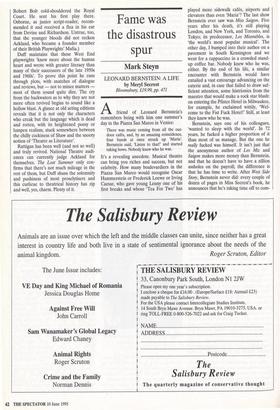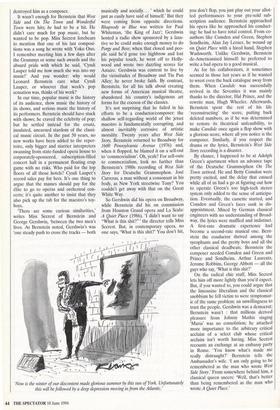Fame was the disastrous spur
Mark Steyn
LEONARD BERNSTEIN: A LIFE by Meryl Secrest Bloomsbury, £19.99, pp. 471 Afriend of Leonard Bernstein's remembers being with him one summer's day in the Piazza San Marco in Venice:
There was music coming from all the out- door cafés, and, by an amazing coincidence, four bands at once struck up 'Maria'. Bernstein said, 'Listen to that!' and started taking bows. Nobody knew who he was.
It's a revealing anecdote. Musical theatre can bring you riches and success, but not celebrity. How many boulevardiers in the Piazza San Marco would recognise Oscar Hammerstein or Frederick Loewe or Irving Caesar, who gave young Lenny one of his first breaks and whose 'Tea For Two' has
played more sidewalk cafés, airports and elevators than even 'Maria'? The last show Bernstein ever saw was Miss Saigon. Five years after his death, it's still playing London, and New York, and Toronto, and Tokyo; its predecessor, Les Miserables, is 'the world's most popular musical'. The other day, I bumped into their author on a pavement in South Kensington and we went for a cappuccino in a crowded stand- up coffee bar. Nobody knew who he was, either. By the end of his life, a similar encounter with Bernstein would have entailed a vast entourage advancing on the eaterie and, in case that failed to draw suf- ficient attention, some histrionics from the maestro that would make a rock star blush: on entering the Pfister Hotel in Milwaukee, for example, he exclaimed wittily, 'Wel- come to the Fist Fuck Hotel!' Still, at least they knew who he was.
Bernstein, says one of his colleagues, 'wanted to sleep with the world'. In 72 years, he fucked a higher proportion of it than most of us manage. But the one he really fucked was himself. It isn't just that the anonymous author of Les Miz and Saigon makes more money than Bernstein, and that he doesn't have to have a zillion assholes on the payroll; the difference is that he has time to write. After West Side Story, Bernstein never did: every couple of dozen of pages in Miss Secrest's book, he announces that he's taking time off to com- pose; and each time, by the close of the chapter, he's back on the treadmill of inter- national conducting. The composer became a corporation, run by guys whose job it was to tell orchestra managements that, when it came to hotels, `I'm sorry, Mr Bernstein has to have the whole top floor.' But why? He only had one butt and, even given his predilection for young and attentive male assistants, there were only so many beds he could park it in a single night. In Japan, where a star conductor could clear 80,000 bucks per show, he gave a performance of Mahler where `the sparks just flew'. `So what?' said Bernstein bleakly. `Five years from now, who will know we have done this?' He got the bows. But he never wrote another `Maria'.
Celebrity trails in its wake biographers. What's the story on Fritz Loewe? He wrote Brigadoon, then Paint Your Wagon, My Fair Lady, Gigi, Camelot, then he retired. Big deal. .But Lenny! Everyone knew Lenny! Lenny leaping to Mahler in bell-bottoms and kerchief, Lenny setting a quatrain by Paul Simon, Lenny sharing canapes with the Black Panthers, Lenny having sex with Aaron Copland! I've always found it inter- esting that two of his oldest friends, Betty Comden and Adolph Green, his lyricists for On The Town and Wonderful Town, speak of him as `Leonard': they knew him before he became Lenny. But it's leapin' Lenny who attracts the biographers. Joan Peyser, a sort of Klassical Kitty Kelley, was a hoot; Humphrey Burton, Bernstein's favourite TV producer, turned out to be surprisingly good on the sex but disappoint- ing on the music. But both came from the classical end of things and it's unsurprising that Burton never questioned whether Bernstein, instead of, say, making a TV programme on some dead longhair's requiem with Humphrey Burton, mightn't have been better employed writing another show with Comden and Green.
When someone says 'Bernstein', what springs to mine? For most of us, it's:
New York, New York!
A helluva town!
The Bronx is up And the Battery's down ...
Or:
There's a place for us Somewhere a place for us ...
Meryle Secrest isn't a musical comedy gal, either. In fact, she's pretty hopeless on all the music: George Abbott wasn't the producer of Wonderful Town — he was the director; when she appeared in Candide, Barbara Cook was not 'famous for her roles in Oklahoma! and Carousel' — she'd only played Oklahoma! on the road in a supporting role in an out-of-town revival. But Miss Secrest is the first of his biogra- phers to understand that Bernstein's sur- render to the clammy embrace of the classical music racket was a tragedy which destroyed him as a composer.
It wasn't enough for Bernstein that West Side and On The Town and Wonderful Town were hits; he had to be a hit. He didn't care much for pop music, but he wanted to be pop. Miss Secrest forebears to mention that one of his last composi- tions was a song he wrote with Yoko Ono. I remember meeting him a few days after the Grammys or some such awards and the absurd pride with which he said, `Cyndi Lauper told me how much she was into my music!' And you wonder: why would Leonard Bernstein care what Cyndi Lauper, or whoever that week's pop sensation was, thinks of his work?
In our time, popular music is the history of its audience, show music the history of its shows, and serious music the history of its performers. Bernstein should have stuck with shows; he craved the celebrity of pop; but he settled instead for the ersatz, insulated, unearned stardom of the classi- cal music circuit. In the past 50 years, no new works have been added to the reper- toire, only bigger and starrier interpreters swanning from state-funded opera house to corporately-sponsored, subscription-filled concert hall in a permanent floating crap game with no risks. Who paid for the top floors of all those hotels? Cyndi Lauper's record sales pay for hers. It's one thing to argue that the masses should pay for the elite to go to operas and orchestral con- certs; it's quite another to insist that they also pick up the tab for the maestro's toy- boys.
'There • are some curious similarities,' writes Miss Secrest of Bernstein and George Gershwin, 'between the two men's lives. As Bernstein noted, Gershwin's was 'one steady push to cross the tracks — both musically and socially.. . ' which he could just as easily have said of himself.' But they were coming from opposite directions. Rhapsody in Blue was written for Paul Whiteman, 'the King of Jazz'; Gershwin hosted a radio show sponsored by a laxa- tive so he could make enough money to do Porgy and Bess; when that closed and peo- ple said he'd gone too highbrow and lost his popular touch, he went off to Holly- wood and wrote two dazzling scores for Astaire. Gershwin was content to live by the vicissitudes of Broadway and Tin Pan Alley; he never broke faith. By contrast, Bernstein, for all his talk about creating new forms of American musical theatre, abandoned his country's indigenous art forms for the cocoon of the classics.
It's not surprising that he failed in his efforts to be a conductor/composer: the shallow self-regarding world of the jetset maestro is fundamentally corrupting, and almost inevitably corrosive of artistic morality. Twenty years after West Side Story, Bernstein returned to Broadway for 1600 Pennsylvania Avenue (1976) and, when it flopped, he blamed it on a sell-out to 'commercialism'. Oh, yeah? For sell-outs to commercialism, look no further than Bernstein's 1980s recording of West Side Story for Deutsche Grammophon. Jose Carreras, a man without a consonant in his body, as New York streetwise Tony? You couldn't get away with that on the Great White Way.
So Gershwin did his opera on Broadway, while Bernstein did his on commission from Houston Grand opera and La Scala: A Quiet Place (1986). 'I didn't want to say "What is this shit?"' the director tells Miss Secrest. But, in contemporary opera, no one says, 'What is this shit?' You don't hit, 'Now is the winter of our discontent made glorious summer by this sun of York Unfortunately this will be followed by a deep depression moving in from the Atlantic.' you don't flop, you just play out your allot- ted performances to your pre-sold sub- scription audience. Bernstein approached his opera like he approached his conduct- ing: he had to have total control. From co- authors like Comden and Green, Stephen Sondheim, Alan Jay Lerner, he wound up on Quiet Place with a hired hand, Stephen Wadsworth. Unlike Gershwin, Bernstein de-Americanised himself: he preferred to write a bad opera to a good musical.
As for his collaborators, it sometimes seemed in those last years as if he wanted to wrest even the back catalogue away from them. When Candide was successfully revived in the Seventies it was mainly thanks to the director, Hal Prince, and the rewrite man, Hugh Wheeler. Afterwards, Bernstein spent the rest of his life 'reconstructing' the score, putting back deleted numbers, as if he was determined to restore its theatrical unfeasibility, to make Candide once again a flop show with a glorious score, where all you notice is the composer. Similarly, if you respect the drama or the lyrics, Bernstein's West Side Story recording is a disaster.
By chance, I happened to be at Adolph Green's apartment when an advance tape of the Deutsche Grammophon On The Town arrived. He and Betty Comdon were pretty excited, and the delay that ensued while all of us had a go at figuring out how to operate Green's too high-tech stereo system only added to the sense of anticipa- tion. Eventually, the cassette started, and Comden and Green's faces sank in dis- appointment. Mixed by German classical engineers with no understanding of Broad- way, the lyrics were muffled and indistinct. A first-rate dramatic experience had become a second-rate musical one. Bern- stein the conductor thrived among the sycophants and the pretty boys and all the other classical deadbeats. Bernstein the composer needed Comden and Green and Prince and Sondheim, Arthur Laurents, Jerome Robbins, George Abbott — all the guys who say, 'What is this shit?'
On the radical chic stuff, Miss Secrest lets him off more lightly than you'd expect. But, if you wanted to, you could argue that the limousine liberalism and the classical snobbism he fell victim to were symptomat- ic of the same problem: an unwillingness to trust the people. Gershwin was a democrat; Bernstein wasn't : that millions derived pleasure from Johnny Mathis singing 'Maria' was no consolation; he attached more importance to the arbitrary critical acclaim of a select club whose critical acclaim isn't worth having. Miss Secrest recounts an exchange at an embassy party in Rome. 'You know what's made me really distraught?' Bernstein tells the Ambassador's wife. 'I am only going to be remembered as the man who wrote West Side Story.' From somewhere behind him, a classical queen sneers: 'Well, that's better than being remembered as the man who wrote A Quiet Place.'




































































 Previous page
Previous page